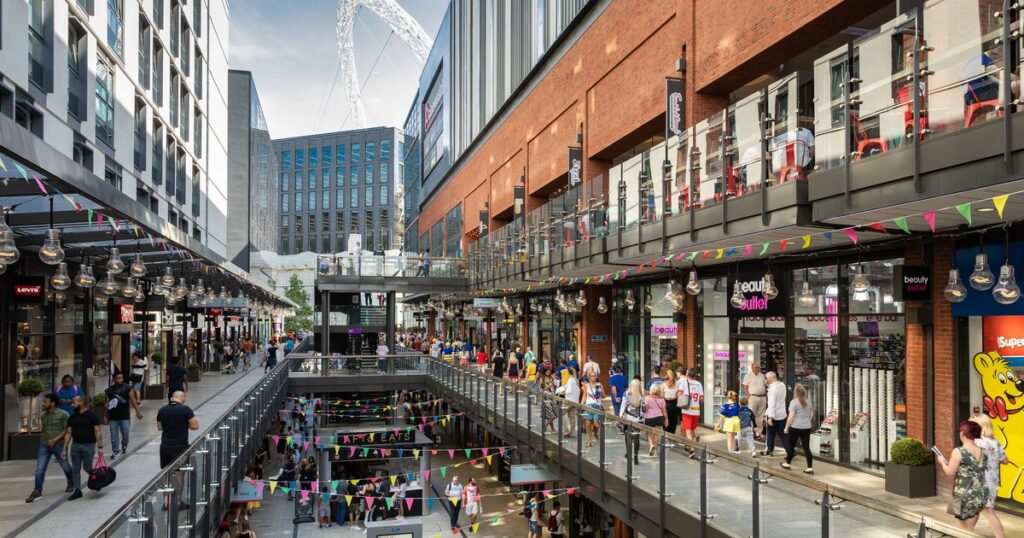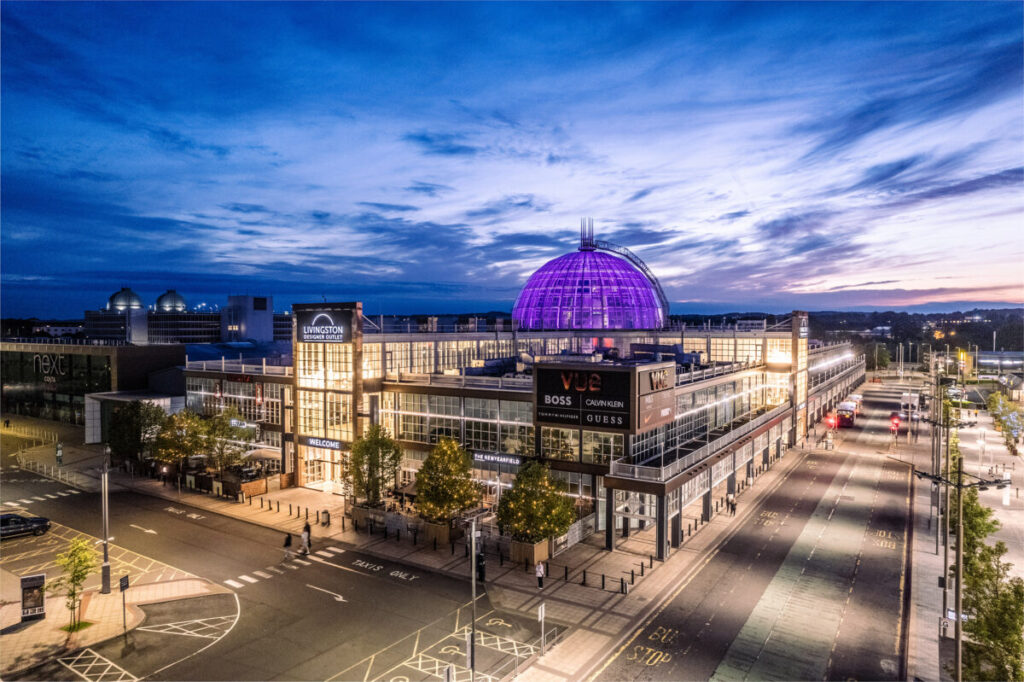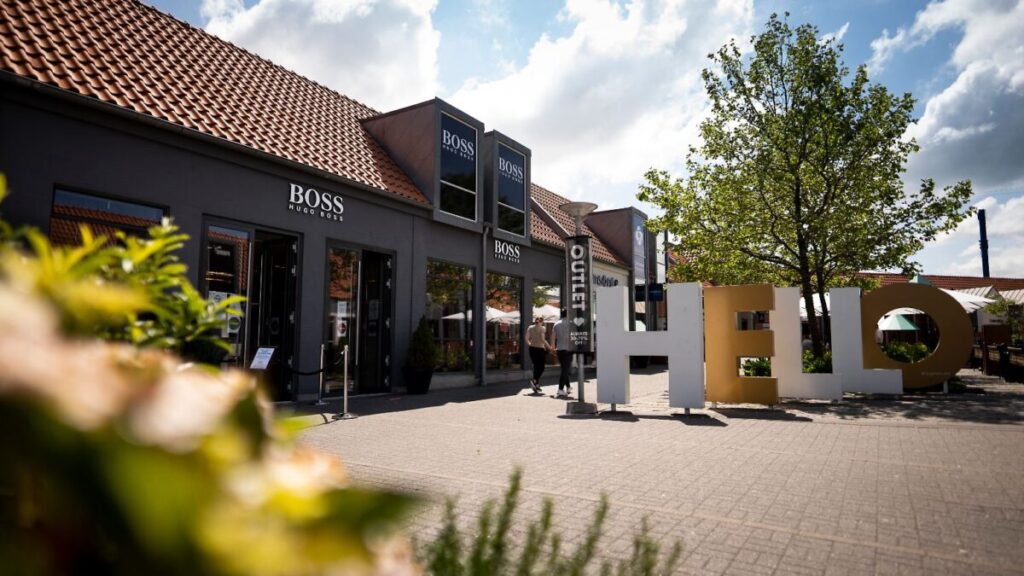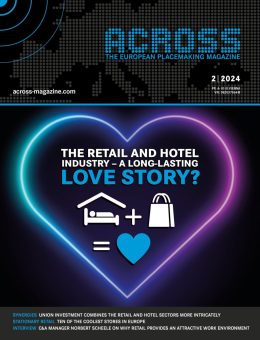ACROSS: What are the most significant developments in the outlet industry in 2023?
Dan Mason: A huge topic for outlets is engagement with their core catchment and their communities. We, as a business, are very much focused on who our customers are and where they come from. This means that we want to offer guests to our schemes a lot more than just retail, in the form of events and experiences. But that also means that we address changes in consumer behavior, such as the desire for a more rigorous approach to sustainability. A community approach is very much linked to other important success factors like ESG activities and technology. However, whilst it is important for all outlets to embrace other complementary uses to widen the customer appeal, we must not forget that international, desirable brands are the cornerstone of our sector.
ACROSS: This is in line with the general trend of more entertainment in the placemaking industry.
Mason: Sure, people do not just come for shopping. Increasing their dwell time by increasing the cultural offer is a successful tool. A couple of great examples include the new McArthurGlen Designer Outlet scheme in Paris-Giverny, with its significant amount of activities and facilities devoted to artisans and one of our schemes in the UK which ran a wellbeing and health festival. We are seeing a lot of evidence that that events, culture and art are extending the dwell time. However, the most important success ingredient for outlets is the value of the offer that they provide. The continued premiumization of the centers is really important at the moment. By this, I mean investing in customer facilities and elevating the brand mix. All outlet operators are trying to move their schemes forward: better restaurants, better brands, better facilities, better car parking. That is clearly beneficial given the turnover lease model. The more we invest in that, the better the schemes perform, and consequently, the more successful they will be.
ACROSS: What are the technological trends you currently see in outlets?
Mason: 2023 is definitely driven by technology. The adoption of tech is an area of growing importance, from retailers improving their own digital displays and mobile sales terminals, to the ability of outlets to interact with consumers on a truly omnichannel basis. The continued adoption of technology is certainly something to watch this year.
ACROSS: Most outlets still lack a real omnichannel strategy.
Mason: It is an evolving strategy. Some outlet operators have introduced their online equivalent portal. We have not gone that far yet. The physical retailing remains the center of what we do. Nevertheless, we use omnichannel elements as additions to make it easier for customers and enhance the experience. For example, we operate a service called “Drop It,” where people can buy their goods and leave them in-store. We will collect them from the store and deliver them to their homes. Such services provided by technology are really important. Most important for us is anonymized mobile tracking technology to understand where our customers are coming from, which stores they go into, where they spend and how long they dwell. We are using this technology throughout the portfolio.
ACROSS: You are especially active in the UK market. What is special about the market compared to other markets in Europe?
Mason: There are over 32 outlets in the UK market now and this is considered quite a mature sector with an established hierarchy. Europe has a number of excellent centers and operators but we do see opportunities across the continent and we have just bought our first scheme with a joint venture with PATRIZIA at Ringsted in Denmark. We see this as a natural step to bring our operating model, our relationships with international brands and our investment advisory experience into Europe. As the European outlet sector continues to evolve, we are seeing schemes that are still owned by their original developers which are now perfectly placed for adding value and further investment. This is coinciding with increased investor appetite in this resilient sector – it is an exciting time. There are not many operators like us in Europe and we see a huge opportunity to play a part in the future of development outlets in this diverse region.



ACROSS: One of your key assets is Scotland’s largest Designer Outlet, Livingston. You repositioned this scheme extensively. What steps did you take?
Mason: Starting prior to Covid in 2019 we repositioned the scheme with an almost €8million investment. The first element was a physical improvement to enhance the guest journey experience and to create a more premium finish throughout the scheme. This included replacing flooring, lighting and improving finishes throughout the scheme. Furthermore, we enhanced the vertical circulation to the first floor and the signage and branding. We created pause points where guests could sit and relax, recognizing that an outlet visit is often a whole ‘day-out‘ experience.
The other part of the investment was that we wanted the stores and brands to come with us on that aspirational journey in terms of their own desire to provide excellent service and enhanced store performance. In a way it was a cultural change project, a really focused effort to raise the game for everyone at the asset. We gave the teams tools to show their total pride in their stores and elevate the whole asset experience. We ran a training programme on how to create a world-class customer service, and we brought in a five-star internationally renowned hotel group to share their insights and approach. This might sound unusual for retail, but, in reality, we are in the hospitality business. There is no better experience than one from a luxury hotel when it comes to the best service. And through this additional project, which we call “Project Aspire,” we generally saw that stores were willing to invest in their shop fits. A number of brands were keen to renew their leases on longer terms. And importantly, the staff took real pride in trying to deliver better customer service.
ACROSS: Why is this close cooperation so important?
Mason: The base for successful cooperation goes back to the collaborative lease structure. The fact that there are turnover-based rents, and therefore, it is in everyone’s interests to drive sales and improve the performance of the individual stores. That involved working closely with brand head offices through to assisting the store staff with practical retail and sales promotion advice to deliver that performance. The landlord is incentivized to spend to resource the scheme properly, to create the right level of investment, to have the right management structure. As operators, it is absolutely our interest to be directly aligned with the performance of the stores. It is a win-win for everyone. It is in our company vision statement to achieve performance and growth through collaboration. All our center managers have retail backgrounds, and so they speak the same language as the store managers and brands. We work with the stores from what their shop front looks like, to marketing, to stock packages, to point of sale. We want our retailers to perform to their best ability. In return, the retailers are willing to share their data. We monitor the data very carefully on a daily basis. And we know exactly the performance of each store throughout our portfolio, which is clearly really different from a traditional shopping center where perhaps rents are reviewed every few years as a matter of course.
ACROSS: Is this the main reason why Outlets perform better in challenging times?
Mason: The collaborative approach of outlets was extremely visible during the pandemic. We rolled up our sleeves and spoke to every tenant in our portfolio. I think the reputations and relationships that were made during those difficult times will pay dividends going forward. Outlets have been a great success story even through difficult economic times, and this remains valid today beacuse people are seeking a value proposition more than ever before. Consequently, the investment market for outlets is good as well. There are lessons that can be learned. While the introduction of an outlet lease into every shopping center may not work, the collaboration, mindset, working partnership, and gathering and sharing of data should benefit everyone.
ACROSS: Which brands or retailers are very successful at the moment in your outlets?
Mason: Particularly, sports brands like Nike and Adidas continue to do very well. They have a requirement for additional space and are investing in their stores in all our schemes. In the London Designer Outlet, we have just upsized Nike over two levels, which is an ambition we have been working on for several years with them. The more premium brands like Tommy Hilfiger, Calvin Klein, or Hugo Boss are trading exceptionally well throughout our portfolio. Clearly, the pandemic changed the requirements for certain classes of goods, but consumer trends are continually evolving, and we have the data and relationships to help brands stay ahead of the game. An interesting example, that many people predicted the demise of the formal attire market during the pandemic, but we are now seeing this sector really bounce back strongly as events and celebrations are back on the agenda!
ACROSS: What trends do you see in leisure and gastronomy?
Mason: There are a number of schemes both in the UK and Europe that have a requirement for more food and beverage in a higher quality; adding dwell time and a ‘day-out‘ experience is hugely important for the outlet shopper. A great example is Gunwharf Quays in Portsmouth, where they have dedicated over 25% of their floor area to food and beverage. The average in the UK is probably around 10%-15%. Having the right coffee shops in strategic locations, and looking at where leisure can play a role is all important to the mix. In some of our schemes, we are looking at where we can bring in cinemas, bowling or other leisure concepts.
ACROSS: How do you deal with independent brands in your schemes?
Mason: Today’s independent brand might be tomorrow’s national or international brand. We recognize that schemes that have a reasonable proportion of independent brands gain additional customer interest and appeal, and strengthen their value to the community in that local area. But it is also true that these brands require more management time and care. Therefore, the percentage of independent brands really depends on individual dynamics of each scheme.
ACROSS: ESG is one of the biggest topics in the markets. What is your answer to this topic?
Mason: As a company, we are pursuing certification with B Corp Certification. This will give our team, our investors, and our brand partners the further comfort in our ability to uphold the highest ESG standards. Investors, brands, and even customers – particularly the younger demographic, are interested in our ESG credentials as a business. We have a number of ESG criteria and KPIs that we work with, from the widespread introduction of solar and electric vehicle charging stations to working very hard on green initiatives and reducing our waste. In our UK assets, for example, we send nothing to landfill, and our energy is green. In fact, we work hard to foster that sort of spirit of competition amongst our teams at each asset to outdo each other in pursuit of their ESG targets. A huge motivation for this is our awards. Each year our centers are invited to submit their best initiatives. This year, Livingston Designer Outlet won with its activity in a relationship with a local specialist school, where children could sell their own products they were making from the site.
ACROSS: How do you see ESG – is it just an investment or is there also money in this topic?
Mason: There is of course a clear business case for this. Simply because our customers are requiring it, and they are making their shopping decisions based on where they feel trust in a scheme. Especially true in the younger generation that they vote with their feet. So, it is crucial to communicate the initiatives that outlet centers and outlet brands are doing on the ground. In terms of the cost of implementing more sustainable practices at the assets, there are many initiatives, such as solar panels, that produce a direct return because we are reducing our energy consumption and selling energy back to the grid, and at the same time, the costs of implementing that technology is coming down. Furthermore, there is the investment point of view: investors in pension funds are absolutely insisting that there is a good ESG requirement.
ACROSS: What are your company’s plans for the ongoing year?
Mason: Following our recent co-acquisition of Denmark’s Ringsted Outlet with PATRIZIA as our capital partner, we are looking forward to building our presence and bringing our expertise to mainland Europe as the outlet retail model continues to go from strength to strength. Our experience both as an operator and advisor puts us in a unique position to add value to investors who are actively pursuing growth in this sector. Outlet centers continues to buck the retail trend where collaboration with brands and responsiveness on the ground can add exponential potential to any holding. In the UK we are continuing to drive performance across the assets we manage and looking forward to announcing the exciting pre-let line up at Cotswolds Outlet, where we have been acting as advisor and will be the asset and property manager of the completed scheme.

Dan Mason is Co Founder and Managing Director at Realm Ltd






